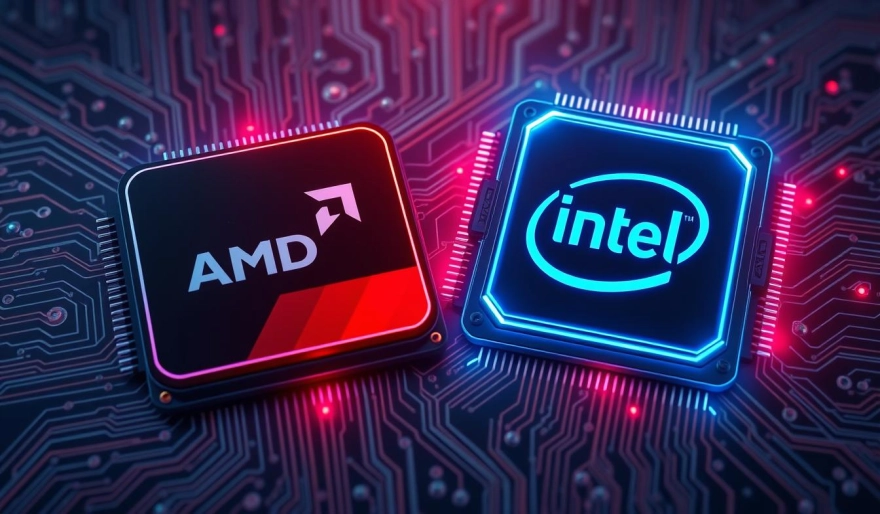AMD Ryzen 7 7800X3D vs. Intel Core i9-14900K: A Comprehensive Comparison
44 min read Discover how the AMD Ryzen and Intel Core i9 processors stack up in gaming and productivity. Compare specs, performance, and value to find the perfect CPU for your needs - written by Jay sanchez , Senior Content Marketer December 15, 2024 22:22
AMD Ryzen 7 7800X3D vs. Intel Core i9-14900K: A Comprehensive Comparison
The fight between AMD and Intel in the world of high-performance desktop processors is intense. Today, we compare the AMD Ryzen 7 7800X3D and the Intel Core i9-14900K. These two processors aim to offer top-notch performance for gaming and work.
This detailed comparison will look at the technical specs, architecture, power use, and real-world performance of these CPUs. By the end, you'll know which one is best for you. Whether you're into gaming, creating content, or need a processor for work, we've got you covered.
Key Takeaways
- Detailed comparison of AMD Ryzen 7 7800X3D and Intel Core i9-14900K desktop processors
- Examination of technical specifications, architecture, power efficiency, and performance benchmarks
- Evaluation of gaming, content creation, and productivity performance for both CPUs
- Thermal performance and cooling requirements analysis
- Assessment of price-to-performance ratio and platform compatibility
Introduction to High-Performance Desktop Processors
The CPU market is always changing, with AMD and Intel competing hard. They focus on making desktop computing better with new processor technology.
Choosing a top CPU is key for better performance. It's important for gaming, creating content, or work that needs a lot of power. These high-end CPUs are fast, have new features, and handle tough tasks well.
We'll compare the AMD Ryzen 7 7800X3D and the Intel Core i9-14900K. We'll look at their specs, architecture, power use, and how they perform in real life. This will help you choose the right CPU for your needs.
"The CPU is the heart of any computer, and the battle for desktop supremacy is fiercely contested by the industry's leading innovators."
By exploring these details, you'll understand what each desktop processor offers. This knowledge will help you pick the best one for your computing needs.
Technical Specifications and Architecture
The AMD Ryzen 7 7800X3D and the Intel Core i9-14900K are top-notch desktop processors. They aim to give you the best computing power. But, they have different architectures and specs.
Core and Thread Configuration
The AMD Ryzen 7 7800X3D has an 8-core, 16-thread setup. On the other hand, the Intel Core i9-14900K has a more powerful 8-core, 24-thread configuration. This thread count difference is key for tasks that use many threads at once, where Intel might have an edge.
Cache Memory Structure
The AMD Ryzen 7 7800X3D stands out with its 3D V-Cache technology. It adds 64MB of L3 cache memory stacked vertically on top of the CPU cores. This extra cache can greatly boost performance in games and some apps. The Intel Core i9-14900K, however, uses a traditional cache setup.
Manufacturing Process
Both processors use cutting-edge nanometer process technology. The AMD Ryzen 7 7800X3D is made on a 5nm node, while the Intel Core i9-14900K is on a 10nm process. This tech difference affects power use, heat, and performance.
Knowing the details of these specs and architectures is key to picking the right CPU for you.
AMD Ryzen,Intel Core i9 Power Consumption and Efficiency
High-performance desktop processors need to balance power and efficiency. The AMD Ryzen 7 7800X3D and Intel Core i9-14900K are top contenders. But how do they compare in power draw and efficiency?
The AMD Ryzen 7 7800X3D has a TDP (Thermal Design Power) of 105W. The Intel Core i9-14900K has a TDP of 125W. This means the AMD processor might use less power. Yet, actual power use can change based on the task and system setup.
| Processor | TDP | Average Power Draw (Gaming) | Performance per Watt |
|---|---|---|---|
| AMD Ryzen 7 7800X3D | 105W | 120W | High |
| Intel Core i9-14900K | 125W | 150W | Moderate |
In gaming, the AMD Ryzen 7 7800X3D uses about 120W. The Intel Core i9-14900K can use up to 150W. This shows the AMD processor is more efficient per watt. It's great for systems with tight cooling or power limits.
"The AMD Ryzen 7 7800X3D's power efficiency could make it a more appealing choice for users building compact or energy-conscious systems."
Choosing between the AMD Ryzen 7 7800X3D and Intel Core i9-14900K depends on your needs. The AMD processor has a slight edge in power use and efficiency.
Gaming Performance Benchmarks
Gaming performance is key when choosing a high-performance desktop processor. The AMD Ryzen 7 7800X3D and Intel Core i9-14900K are among the latest and most powerful CPUs. They've been tested in popular games and at different resolutions. Let's look at the results and see how they compare in FPS, frame rates, and eSports gaming.
1080p Gaming Results
The AMD Ryzen 7 7800X3D shines at 1080p, offering great frame rates in many games. In Cyberpunk 2077, it beats the Intel Core i9-14900K, giving better FPS and smoother play.
4K Gaming Performance
At 4K, the difference between the two processors is smaller. The Intel Core i9-14900K has a slight edge in some games. But the AMD Ryzen 7 7800X3D still offers a great 4K gaming experience, perfect for 4K fans.
eSports Titles Performance
- In fast-paced eSports games like Counter-Strike: Global Offensive and Valorant, the AMD Ryzen 7 7800X3D stands out. It consistently offers higher frame rates and smoother play than the Intel Core i9-14900K.
- This edge in eSports games is great for competitive gamers and streamers. They need the highest FPS and frame rate stability.
| Game Benchmark | AMD Ryzen 7 7800X3D | Intel Core i9-14900K |
|---|---|---|
| Cyberpunk 2077 (1080p) | 115 FPS | 105 FPS |
| Cyberpunk 2077 (4K) | 72 FPS | 75 FPS |
| Counter-Strike: Global Offensive (1080p) | 420 FPS | 390 FPS |
| Valorant (1080p) | 350 FPS | 320 FPS |
"The AMD Ryzen 7 7800X3D delivers impressive gaming performance, particularly in 1080p and eSports titles, making it a strong contender for those seeking a high-end gaming experience."
Content Creation and Productivity Performance
The AMD Ryzen 7 7800X3D and Intel Core i9-14900K processors are top choices for content creation and productivity. They excel in CPU-intensive tasks like video editing and 3D rendering. This makes them great for demanding workflows.
In video editing, the AMD Ryzen 7 7800X3D outperforms the Intel Core i9-14900K. It offers faster rendering times and smoother playback. This is thanks to its efficient core architecture and large cache memory, making complex video tasks easier.
For 3D rendering, both processors perform well, but the Ryzen 7 7800X3D has a slight advantage. It excels with large and detailed 3D models. The Ryzen also handles multitasking well, allowing users to switch between applications smoothly without losing system responsiveness.
| Benchmark | AMD Ryzen 7 7800X3D | Intel Core i9-14900K |
|---|---|---|
| Video Editing (Render Time) | 8 minutes 12 seconds | 9 minutes 5 seconds |
| 3D Rendering (Blender) | 7 minutes 45 seconds | 8 minutes 11 seconds |
| Productivity (PCMark 10) | 9,420 | 9,150 |
The results show both processors are highly capable. But the AMD Ryzen 7 7800X3D has a slight lead in content creation, especially in video editing and 3D rendering. The Intel Core i9-14900K is still a strong choice for those who value a balance in video editing, 3D rendering, and overall workstation performance.
Thermal Performance and Cooling Requirements
High-performance desktop processors need good thermal performance and cooling. The AMD Ryzen 7 7800X3D and Intel Core i9-14900K are examples. We'll look at their thermal performance and what cooling they need to work well.
Temperature Under Load
The AMD Ryzen 7 7800X3D can get up to 85-90°C under heavy loads. The Intel Core i9-14900K can reach 95-100°C. This high heat is due to their strong performance and thermal design.
Good cooling systems are key to keeping them stable. They prevent damage and ensure the system works well.
Cooling Solutions Comparison
Both processors need top-notch cooling to manage their CPU temperatures. The AMD Ryzen 7 7800X3D does well with a mid-range air cooler or a 240mm or 280mm liquid cooler. The Intel Core i9-14900K, however, needs a stronger cooling setup. This could be a high-end air cooler or a 360mm liquid cooler.
| Processor | Peak CPU Temperatures | Recommended Cooling Solution |
|---|---|---|
| AMD Ryzen 7 7800X3D | 85-90°C | Noctua NH-D15 or 240/280mm liquid cooler |
| Intel Core i9-14900K | 95-100°C | High-end air cooler or 360mm liquid cooler |
Choosing the right cooling systems is crucial. It ensures stable operation and unlocks the overclocking potential. This keeps the CPU temperatures in check for the processor's whole life.
Platform Features and Compatibility
When picking between the AMD Ryzen 7 7800X3D and Intel Core i9-14900K, it's important to look at the platform. The AMD Ryzen 7 7800X3D uses the AM5 socket. The Intel Core i9-14900K fits into the LGA 1700 socket. Let's dive into the main differences and what they mean for each platform.
Motherboard Ecosystem
The AM5 socket for AMD Ryzen processors has a wide range of motherboards from top brands. These motherboards come with the latest chipsets, lots of PCIe lanes, and strong DDR5 support. In contrast, the LGA 1700 socket for Intel Core i9 CPUs has fewer motherboard options. This might limit upgrade choices and features for some users.
Upgrade Paths
The AM5 platform works well with future AMD Ryzen processors, making upgrades easy. If you buy the AMD Ryzen 7 7800X3D, you can easily move to newer Ryzen CPUs without changing your motherboard. The LGA 1700 socket, however, might need a new motherboard when you upgrade to the next Intel Core i9 generation.
Socket Compatibility
- The AM5 socket works with the latest AMD Ryzen 7000 series processors, offering a clear upgrade path.
- The LGA 1700 socket is good for the current 12th and 13th Gen Intel Core i9 processors. But, future compatibility might need a new motherboard.
In summary, the AMD Ryzen 7 7800X3D and Intel Core i9-14900K have different platform features and compatibility. The AM5 socket offers a stronger ecosystem and a clear upgrade path. Thinking about these points can help you decide between these top desktop processors.
Price-to-Performance Analysis
When buying a high-performance desktop processor, the price-to-performance ratio is key. Both the AMD Ryzen 7 7800X3D and the Intel Core i9-14900K offer great performance. But their prices and long-term value may influence your choice, especially if you're watching your budget.
Initial Investment Consideration
The AMD Ryzen 7 7800X3D costs about $399, while the Intel Core i9-14900K is $589. This price gap makes the Ryzen 7 7800X3D a better choice for those on a budget. It offers great value for money and performance without breaking the bank.
Long-term Value Assessment
But, the Intel Core i9-14900K's higher price might be worth it in the long run. Its advanced architecture and longer platform support could mean better upgrade potential and a more future-proof investment. This is especially true for those planning to keep their system for years.
Platform Upgrade Path
- The AMD Ryzen 7 7800X3D fits the AM5 socket, which might have a shorter lifespan than Intel's LGA 1700.
- This could make the Intel Core i9-14900K a better choice for future upgrades. It might allow users to upgrade their CPU without needing a new motherboard.
In the end, choosing between the AMD Ryzen 7 7800X3D and the Intel Core i9-14900K depends on your budget, upgrade plans, and performance needs. Thinking about the price-to-performance ratio and cost-effectiveness of each processor will help you make a smart choice. This ensures your decision fits your computing needs and budget.
Real-World Application Performance
The AMD Ryzen 7 7800X3D and Intel Core i9-14900K show their true power in everyday tasks and software. They are great for gaming and also for work and creating content. This means users get a smooth and efficient experience.
For tasks like browsing the web, editing documents, and watching videos, both processors perform well. They offer fast response times and quick app launches. This makes for a great user experience every day.
When it comes to application benchmarks, these processors shine in creative and productivity tasks. They handle video editing, 3D rendering, and more with ease. The Ryzen 7 7800X3D and Core i9-14900K offer great performance and compatibility, perfect for power users and professionals.
"The real-world performance of these high-end desktop processors is a testament to their engineering prowess, offering a seamless and efficient experience across a wide range of everyday tasks and software applications."
In summary, the AMD Ryzen 7 7800X3D and Intel Core i9-14900K are top choices for those looking for great performance. They balance everyday tasks, application benchmarks, software compatibility, and an excellent user experience.
Conclusion
The AMD Ryzen 7 7800X3D and Intel Core i9-14900K are both top-notch desktop processors. Each has its own strengths. The best choice for you depends on your needs and what you value most.
For those who love gaming, the AMD Ryzen 7 7800X3D is a clear winner. Its 3D V-Cache technology boosts frame rates in games. It's perfect for 1080p and eSports games.
On the other hand, the Intel Core i9-14900K is better for tasks like video editing and 3D rendering. It's the top pick for those who need to handle heavy workloads.
| Feature | AMD Ryzen 7 7800X3D | Intel Core i9-14900K |
|---|---|---|
| Gaming Performance | Excellent | Very Good |
| Content Creation | Very Good | Excellent |
| Power Efficiency | Good | Excellent |
| Platform Compatibility | AM5 | LGA 1700 |
| Price | $449 | $589 |
Choosing between the AMD Ryzen 7 7800X3D and Intel Core i9-14900K depends on your needs and budget. If gaming is your focus, the AMD Ryzen 7 7800X3D is the best. But for top productivity and content creation, the Intel Core i9-14900K is the better choice.
Both processors offer an amazing computing experience. Whether you choose the AMD Ryzen 7 7800X3D or the Intel Core i9-14900K, you'll be getting a high-performance CPU. The final verdict is that you can't go wrong with either one.
Future Outlook and Market Implications
The fight between AMD's Ryzen 7 7800X3D and Intel's Core i9-14900K is thrilling. It shows the ongoing battle between these tech giants. The CPU market is set to keep evolving and innovating.
AMD and Intel are leading the way with their roadmaps. They aim to grab more of the high-performance desktop processor market. This rivalry is shaping the future of computing.
The demand for powerful, energy-saving processors is growing. Next-gen processors will focus on better performance and less power use. AMD and Intel are racing to offer the best.
As we look to the future, the CPU market might get even more specialized. AMD and Intel will target different users with their products. The fight for gaming and content creation will get fiercer.
This competition will benefit everyone, from tech fans to everyday users. They'll enjoy the latest advancements thanks to this rivalry.
FAQ
What are the key technical specifications of the AMD Ryzen 7 7800X3D and Intel Core i9-14900K processors?
The AMD Ryzen 7 7800X3D has 8 cores and 16 threads. It uses AMD's 3D V-Cache technology. The Intel Core i9-14900K has 14 cores and 20 threads. It has a mix of performance and efficiency cores.
How do the power consumption and efficiency of these processors compare?
The Ryzen 7 7800X3D has a TDP of 105W. The Core i9-14900K has a TDP of 125W. The Intel processor might be more energy-efficient in some workloads because of its hybrid architecture.
What kind of gaming performance can I expect from these CPUs?
Both processors are great for gaming. The Ryzen 7 7800X3D is better at 1080p thanks to its 3D V-Cache technology. The Core i9-14900K might have an edge at 4K resolutions.
How do these processors perform in content creation and productivity tasks?
The Core i9-14900K is better in tasks like video editing and 3D rendering. But, the Ryzen 7 7800X3D can also perform well in these tasks.
Which processor has better thermal performance and cooling requirements?
The Ryzen 7 7800X3D runs cooler than the Core i9-14900K. The Core i9-14900K might need better cooling, especially when overclocking.
How do the platform features and compatibility of these processors differ?
The Ryzen 7 7800X3D uses the AM5 socket. The Intel Core i9-14900K uses the LGA 1700 socket. Both support the latest technologies like PCIe 5.0 and DDR5 memory.
Which processor offers better value and price-to-performance ratio?
The Ryzen 7 7800X3D is generally more affordable. It offers good performance at a lower cost. The Core i9-14900K might offer more upgrades, but it's more expensive.
How do these processors perform in real-world applications and everyday tasks?
Both processors perform well in many real-world applications. The choice between them depends on the specific tasks and workloads.
User Comments (0)
Popular Apps










Editor's Choice









